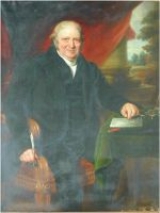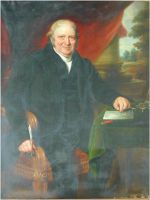
William Winterbotham
Encyclopedia

United Kingdom
The United Kingdom of Great Britain and Northern IrelandIn the United Kingdom and Dependencies, other languages have been officially recognised as legitimate autochthonous languages under the European Charter for Regional or Minority Languages...
Baptist
Baptist
Baptists comprise a group of Christian denominations and churches that subscribe to a doctrine that baptism should be performed only for professing believers , and that it must be done by immersion...
minister
Minister of religion
In Christian churches, a minister is someone who is authorized by a church or religious organization to perform functions such as teaching of beliefs; leading services such as weddings, baptisms or funerals; or otherwise providing spiritual guidance to the community...
and a political prisoner
Political prisoner
According to the Longman Dictionary of Contemporary English, a political prisoner is ‘someone who is in prison because they have opposed or criticized the government of their own country’....
. He wrote some books introducing general information about China
China
Chinese civilization may refer to:* China for more general discussion of the country.* Chinese culture* Greater China, the transnational community of ethnic Chinese.* History of China* Sinosphere, the area historically affected by Chinese culture...
and the United States
United States
The United States of America is a federal constitutional republic comprising fifty states and a federal district...
.
Biography
William Winterbotham was born in Little MinoriesMinories
The Minories is the name of both an area and street in the City of London close to the Tower of London. The street called Minories runs north-south between Aldgate and Tower Hill underground stations...
, Aldgate
Aldgate
Aldgate was the eastern most gateway through London Wall leading from the City of London to Whitechapel and the east end of London. Aldgate gives its name to a ward of the City...
, London
London
London is the capital city of :England and the :United Kingdom, the largest metropolitan area in the United Kingdom, and the largest urban zone in the European Union by most measures. Located on the River Thames, London has been a major settlement for two millennia, its history going back to its...
on 15 December 1763. He was a son of John Winterbotham and Miss Elizabeth Hyett. She was a Gloucestershire woman, and her parents, who lived in Cheltenham had a large influence on William's childhood.
At a very early age he was sent to his grandparent's home in Cheltenham where he lived till his 10th birthday. It was his grandparents who taught him to think for himself. One of his grandfather's quotes was "To be poor may be neither disgraceful nor fault" and "To be mean and dependent is always disgraceful".
William left Cheltenham to return to his parents in London in 1774 where he was apprenticed out as a silversmith at the age of 13 years for 15/- a week. One day he agreed with his brother "to go and hear the devil's preach," for thus they spoke of an African man who was there preaching in open spaces in London. They went, and his brother was "saved" that day. His brother's temperament and change deeply affected him so he was persuaded to accompany his brother to a meeting in Pennington Street where a Mr Radford was preaching. It was here in 1796 that he, himself was "saved". His parents were not happy with William's decision because "to become a Dissenter" was considered wrong for him and a disgrace to his parents.
He had promised to accompany a preacher to Sydenham Common to hear an open-air service but at the last minute the preacher failed to turn-up so the asked William to take his place. He conducted the service with so much enthusiasm that he was asked to preached at Beckenham that same night.
It was in 1789 he was baptised in the river at Old Ford and thus became a Baptist Minister. In the same year, he was asked to assist a Mr Gibb's, the pastor of the Baptist Church at How's Lane, Plymouth and in the following year he settled in the area.
The church William ministered began to grow in number and strength. It was three years since he settled in Plymouth that he preached the two sermons which cost him his freedom.
In the first - preached on 5th November 1792 on "The commemoration of National Deliverance" he referred to the French Revolution, that was taking place at the time, and spoke ot with some commendation.
The following is a brief extract from the close of the sermon - "Take no doctrine on trust: you have the scriptures in your hands, use them as the "touchstone of truth:- persecute no man for his religious tenets; labour to spread abroad the rays of divine truth; attend with diligence to the instruction of the rising generation, and instil into their minds proper principles of civil and religious liberty. As Britons, it behoves you in the present important crisis to act with that dignity which has long characterised this nation".
In the second sermon of 18th November 1792, there is scarcely an illusion of political matters, unless a reference to the African slave trade may be so called.
Because he expressed too liberal views in his sermons, Winterbotham was put into jail
Jail
A jail is a short-term detention facility in the United States and Canada.Jail may also refer to:In entertainment:*Jail , a 1966 Malayalam movie*Jail , a 2009 Bollywood movie...
in Newgate Prison
Newgate Prison
Newgate Prison was a prison in London, at the corner of Newgate Street and Old Bailey just inside the City of London. It was originally located at the site of a gate in the Roman London Wall. The gate/prison was rebuilt in the 12th century, and demolished in 1777...
in 1793 and released in 1797 .
The first trial took place before the Hon Baron Perryn and a special jury at Exeter on the 25th Jul 1793. The proceeding where taken in shorthand by a Mr William Bowring and later William Winterbotham published the book. The Council for the Crown was - Mr Sergeant Rooke; Mr Seargeant Lawrence; Mr Morris; Mr Fanshaw; Mr Clapp. Solicitors - Messrs Elford and Foot of Plymouth Dock.
Council for the defendant were - Mr Gibbs, Mr East, Mr Dampier. Solicitor - Mr John Saunders of Plymouth. He was found guilty by a packed jury after two and a half hours deliberation and found Guilty.
The Rev William's second appearance was before Baron Perryn on 26 July 1793 for the sermon preached by him on 18th November 1792. He was sentenced to four years imprisonment and 200 pounds fine.
When he was in prison, he wrote An Historical, Geographical and Philosophical View of the Chinese Empire
Late Imperial China
Late Imperial China refers to the period between the end of Mongol rule in 1368 and the establishment of the Republic of China in 1912 and includes the Ming and Qing Dynasties...
(1795), which provides general information about China, and An Historical, Geographical, Commercial, and Philosophical View of the American United States
United States
The United States of America is a federal constitutional republic comprising fifty states and a federal district...
(4 vols, London
London
London is the capital city of :England and the :United Kingdom, the largest metropolitan area in the United Kingdom, and the largest urban zone in the European Union by most measures. Located on the River Thames, London has been a major settlement for two millennia, its history going back to its...
, 1799) .
On 26 November 1797 he married Mary Brend and they had seven children (4 sons and 3 daughters); he died on 31 March 1829 in Stroud
Stroud
Stroud a town and civil parish in the county of Gloucestershire, England.Stroud may also refer to:*Stroud, New South Wales, Australia*Stroud, Ontario, Canada*Stroud , Gloucestershire, UK*Stroud...
, Gloucestershire.
His granddaughter was Ann S. Stephens
Ann S. Stephens
Ann Sophia Stephens was an American novelist and magazine editor. She was the author of dime novels and is credited as the progenitor of that genre.- Early life :...
.
Further reading
- W. Winterbotham. An historical, geographical, commercial, and philosophical view of the United States of America, and of the European settlements in America and the West-Indies. v.1, v.4

